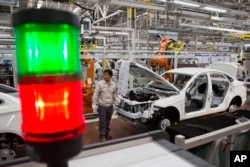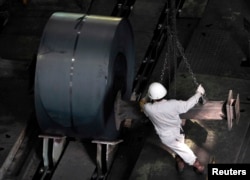The European Chamber of Commerce in Beijing said the European Union is unlikely to lift trade barriers later this year because of growing fears Chinese exports are leading to untold losses of jobs on the continent.
Regardless of whether it is on the campaign trail in the U.S. presidential elections or city streets in Europe, concern that China is stealing jobs is spreading.
Earlier this month, workers representing trade unions in 17 countries demonstrated in Brussels carrying banners that read: “Stop China Dumping” and “Say No to MES (Market Economy Status) for China.”
The unions blame both China and Russia for creating joblessness, which has dogged Europe for 19 straight months up to last December.
Such unrest is making it extremely difficult for European politicians to support China’s demand for being granted the status of a market economy, said Joerg Wuttke, president of the European Chamber of Commerce in China.
Dumping of goods
The European Parliament recently began discussing China’s demand for market economy status, which, if granted, would reduce trade barriers and make it even easier for Chinese exports to flow to Europe.
Critics warn that could lead to even more dumping of goods at unfairly low prices and potential job losses of as much as 10 million.
“My personal observation of the parliament is that it is pretty much unified that China is challenging jobs in Europe and it doesn’t matter whether you are a north or south (of Europe) parliamentarian, you are pretty much against it,” Wuttke said.
Chinese companies are plagued with machine overcapacity and low demand. The firms have tried to export their surplus steel, plunging global prices, which has triggered the closure of plants in Europe.
It has also resulted in a growing number of anti-dumping investigations into Chinese products, the European business lobby noted.
Job losses
On Monday, the European Chamber of Commerce released a report entitled “Overcapacity in China.” Wuttke said that estimates about the extent of job losses by researchers ranges from 100,000 to 10 million.
For its part, China is facing a dilemma. China needs to export more to save jobs at home, but is facing stiff resistance in Europe, its biggest customer, which has slapped a lot of anti-dumping cases that can potentially block the flow of Chinese goods.
Beijing has been candid about the problem as it has rolled out a plan to close down “zombie” corporations that continue to make more than they sell, and keep workers on wage rolls though their machines are idle.
The government’s plans include shutting down 100 million to 150 million tons of low-end steel capacity and 500 million tons of coal production.
But the government is reluctant to follow through on its own plans because of the massive job losses that would follow.
Last year, in one fell swoop, a state-owned coal company laid off 100,000 workers over a three-month period, and hundreds of thousands in the coal and steel sector are expected to lose their jobs in the coming months.
Government wants growth
In fact, Wuttke said some government agencies are encouraging certain businesses to grow even as they struggle with overcapacity.
According to the chamber, only one of the eight industry sectors it studied was not affected by overcapacity while all others were suffering from extremely low demand relative to the amount of goods they can produce.
Regional governments and local banks are encouraging such companies because they continue to chase economic growth. They are also obstructing mergers and acquisitions because they are worried about the tax losses that could bring.
"China is always enticing industries to grow. The system breeds overcapacity," Wuttke said. "You should actually make your assets sweat and utilize them to 100 percent, but that is not the case here, and the industrial landscape is becoming more and more inefficient."













